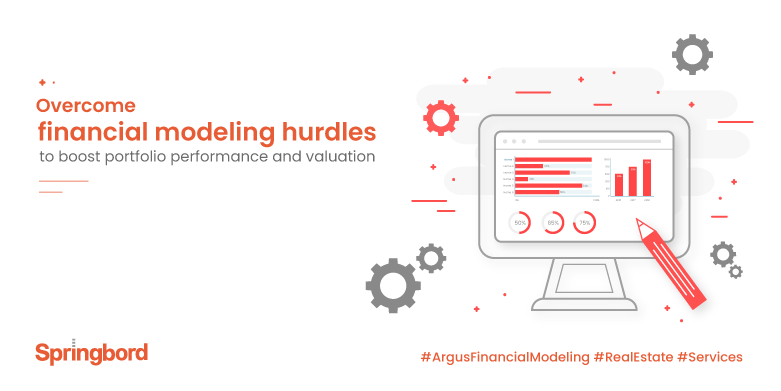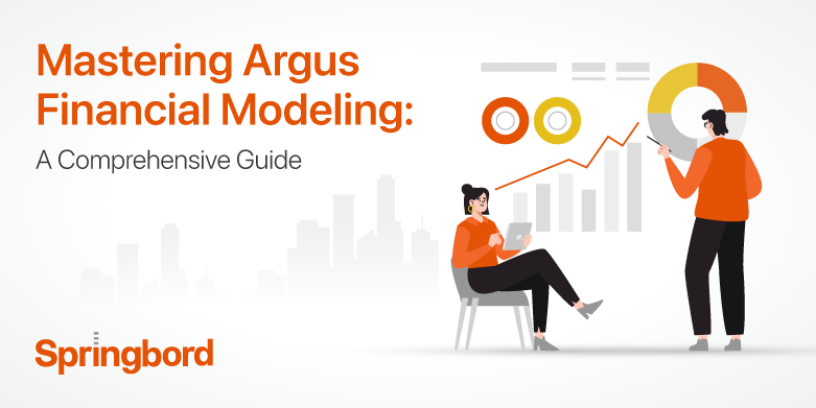 Read time 7 min
Read time 7 minFinancial modelling for commercial real estate requires the use of the Argus software platform. Argus is the industry standard for analyzing complex real estate transactions and portfolios. It is widely recognized and taught in more than 200 universities and colleges worldwide.
This blog seeks to give seasoned business owners and real estate experts a thorough understanding of Argus by emphasizing its importance and the essential characteristics that make it an invaluable tool in the current market.
Argus Software
Argus software is designed to facilitate detailed financial modelling, forecasting, and analysis in commercial real estate. The platform integrates a variety of modules to address different aspects of property management and investment analysis, including Argus Enterprise, Argus Developer, and Argus Valuation DCF.
These tools allow users to create detailed cash flow models, perform asset valuations, and manage portfolios efficiently.
Importance in Real Estate Financial Modeling
Accurate financial scenario modelling is essential in the data-driven real estate industry. The data-driven real estate sector depends on precise financial scenario modelling. Strong solutions from Argus improve asset performance visibility and expedite the financial decision-making process.
Beyond basic forecasting, its capabilities include comprehensive insights into revenue recognition, expense forecasting, and lease analysis, all essential for preserving competitive advantage and guaranteeing regulatory compliance.
The widespread adoption of Argus highlights its significance in real estate financial modelling. According to a report by Altus Group, Argus is utilized in over 100 countries, providing critical support to investors, asset managers, and financial analysts in making data-driven decisions.
Key Features
- Scenario Analysis: Argus enables users to simulate various investment scenarios, assessing the impact of different variables such as market conditions, lease terms, and financing options. This feature is particularly valuable for stress testing and strategic planning, helping businesses anticipate potential challenges and opportunities.
- Cash Flow Projections: The software allows for detailed cash flow modelling at both the property and portfolio levels. Users can input specific lease and expense data to generate accurate projections, facilitating better financial planning and management. Argus’s ability to handle complex lease structures and operating expenses makes it a preferred tool among industry professionals.
- Valuation Metrics: Argus supports multiple valuation methods, including Discounted Cash Flow (DCF) analysis, which is essential for determining the present value of future cash flows. This feature ensures that investors and asset managers can perform rigorous valuations, enhancing their ability to negotiate and make informed investment decisions.
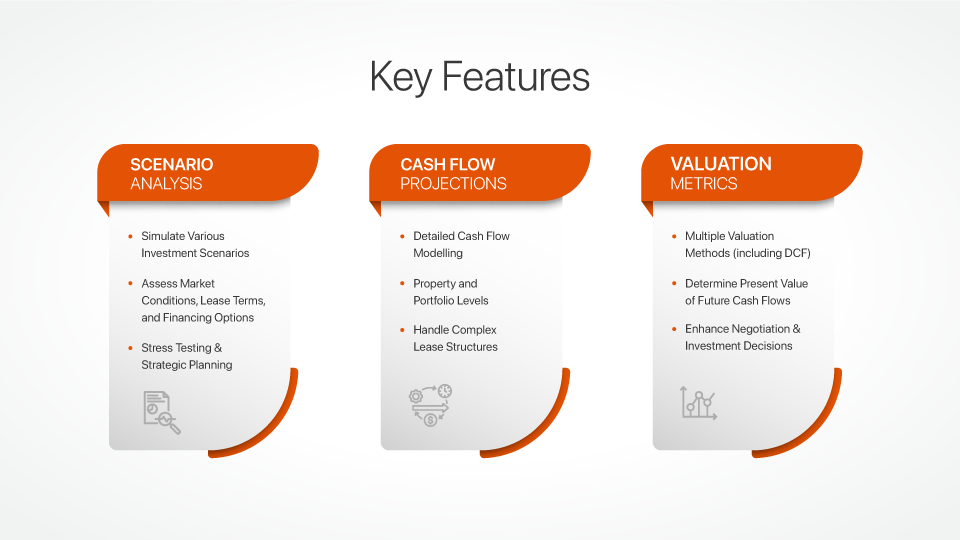
Understanding Argus Fundamentals
For real estate professionals looking to improve their financial modelling skills, understanding the foundations of Argus software is essential.
Financial Projections and Analysis
For real estate professionals who want to do accurate long-term financial forecasting, Argus software is a crucial tool. Argus makes it easier for users to gain a thorough understanding of an asset’s financial performance over time by letting them create intricate cash flow models.
These models provide a comprehensive picture of expected financial outcomes by incorporating a variety of inputs, including rental income, operating costs, and capital expenditures.
One of the standout features of Argus is its scenario analysis capability. This allows users to simulate different market conditions and investment strategies, assessing their potential impact on financial performance. By conducting sensitivity testing, professionals can identify key risk factors and opportunities, making informed decisions that align with their strategic goals
Key Metrics and Outputs
Argus produces crucial metrics necessary for assessing real estate investments to guarantee solid financial analysis:
- Net Present Value (NPV): This metric calculates the present value of future cash flows, discounting them back to today’s dollars. It helps investors determine the profitability of a project, considering the time value of money.
- Internal Rate of Return (IRR): The IRR represents the discount rate that makes the NPV of all cash flows from a particular project equal to zero. It is important to compare the profitability of multiple investments.
- Cash-on-Cash Return: This measures the annual return made on an investment relative to the amount of cash invested. It provides insight into the immediate return expectations of a real estate asset.
In addition to these metrics, Argus allows for detailed lease and property-level assumptions, enabling precise customisation of financial models.
Users can input specific lease terms, rent escalations, vacancy rates, and other property-specific details to enhance the accuracy of their projections.
Through the use of these potent features, Springbord’s expertise in Argus financial modelling assists clients in optimizing their real estate investments. To enable our clients to confidently make data-driven decisions, we offer specialized modelling services that improve asset performance visibility and expedite financial analysis procedures.
Advanced Techniques in Argus
Mastering advanced techniques in Argus involves scenario planning and detailed revenue stream analysis, which are crucial for optimizing real estate financial modelling.
These techniques allow professionals to develop multiple financial scenarios, stress test models, integrate market research, and manage complex lease structures, rent rolls, and expense reimbursements effectively.
1. Scenario Planning
Scenario planning in Argus involves developing multiple financial scenarios to evaluate the potential impact of different market conditions and investment strategies on real estate assets.
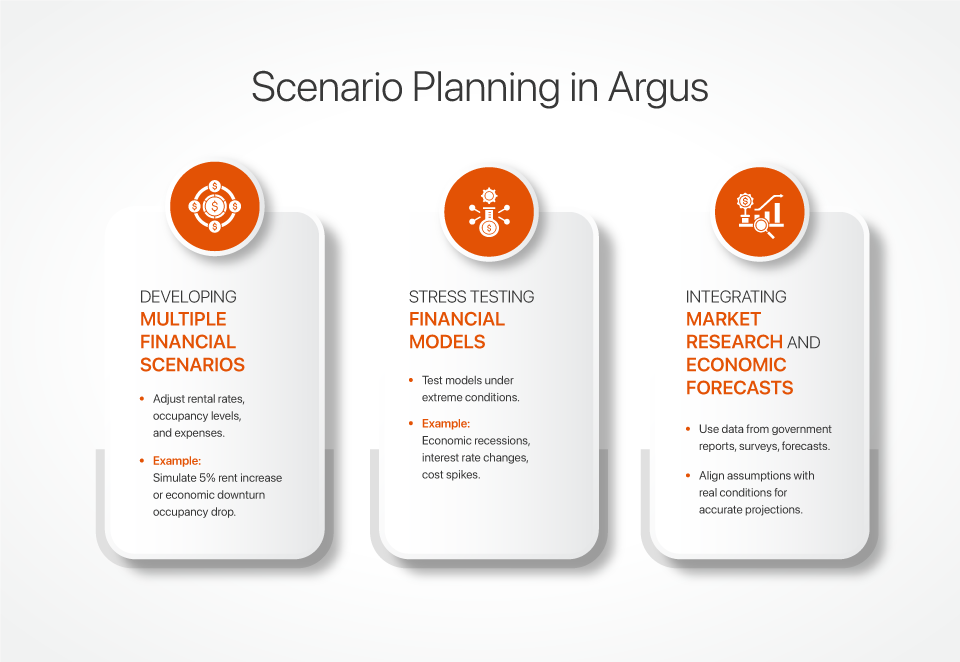
This advanced technique helps in identifying and mitigating risks while exploring opportunities for maximizing returns.
- Developing Multiple Financial Scenarios
In Argus, users can create various scenarios by adjusting key assumptions such as rental rates, occupancy levels, and operating expenses. This allows real estate professionals to model the financial outcomes of different strategies and market conditions. For instance, one can simulate scenarios where market rents increase by 5% annually or where occupancy rates drop due to economic downturns.
- Stress Testing Financial Models
One of the most important aspects of scenario planning is stress testing. It involves subjecting financial models to extreme conditions to assess their resilience. Argus enables users to stress test their models by introducing variables such as economic recessions, changes in interest rates, or sudden increases in operating costs. This helps in figuring out how resilient an investment is under trying conditions and in developing plans to lower risk.
- Integrating Market Research and Economic Forecasts
Integrating market research and economic forecasts into Argus models enhances the accuracy of financial projections. Users can better align their assumptions with actual conditions by incorporating data from reliable sources, such as government reports, market surveys, and economic forecasts. This integration allows for more realistic and reliable scenario analysis, providing a solid foundation for strategic decision-making.
2. Detailed Revenue Streams Analysis
Detailed revenue stream analysis in Argus involves a deep dive into various income sources and their management to ensure accurate financial projections and optimal asset performance.
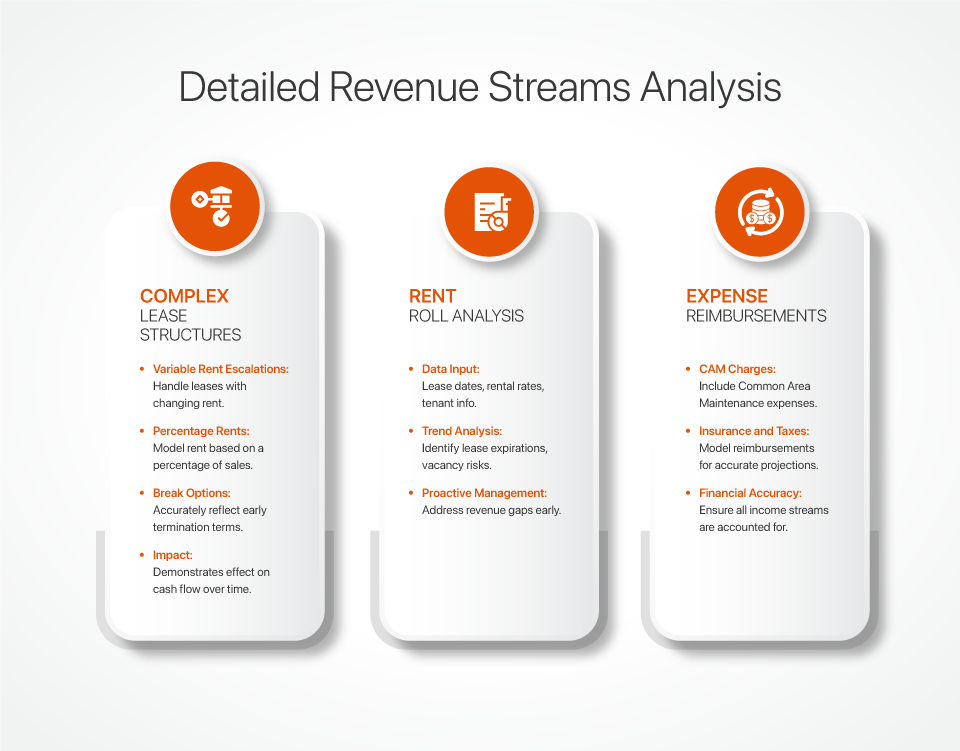
- Handling Complex Lease Structures
Argus is equipped to handle complex lease structures, including those with variable rent escalations, percentage rents, and break options. This capability ensures that all lease terms are accurately reflected in the financial models, providing a true representation of expected revenues. For example, a lease with a base rent plus a percentage of sales can be modelled to show its impact on cash flow over time.
- Rent Roll Analysis and Management
Rent roll analysis is essential to comprehending a property’s potential revenue. Argus allows users to input detailed rent roll data, including lease start and end dates, rental rates, and tenant information. This data can be analyzed to identify trends, such as upcoming lease expirations or areas with high vacancy risks. Effective rent roll management ensures that potential revenue gaps are identified and addressed proactively.
- Expense Reimbursements and Tenant Recoveries
Argus also facilitates the analysis of expense reimbursements and tenant recoveries, which are essential for accurate financial projections. Users can model CAM charges, insurance, and property tax reimbursements to ensure these income streams are correctly accounted for.
At Springbord, we use our proficiency with Argus to guide clients through these sophisticated methods, which include comprehensive revenue stream analysis, scenario planning, and stress testing.
If you’re looking to enhance your property management strategies and navigate complex financial landscapes, contact us today.
Compliance and Regulatory Considerations
Real estate financial modelling requires careful handling of compliance and regulatory requirements. Key responsibilities that are effectively handled by Argus software include managing revenue recognition complexity and guaranteeing compliance with standards like IFRS and GAAP.
Argus also helps to optimise tax strategies by managing tax liabilities and forecasting obligations, which improves overall financial performance and compliance readiness.
Financial Reporting Standards
Ensuring compliance with financial reporting standards such as GAAP (Generally Accepted Accounting Principles), IFRS (International Financial Reporting Standards), and other local regulations is important to real estate businesses.
Argus aids in maintaining compliance by providing tools that accurately reflect the financial status and performance of properties by these standards.
- Ensuring Compliance with GAAP, IFRS, and Other Local Standards
Argus software helps in aligning financial reporting with GAAP and IFRS by automating the application of these standards in financial models. This ensures that revenue recognition, lease accounting, and financial disclosures meet regulatory requirements.
- Handling Revenue Recognition Complexities
Revenue recognition in real estate can be complex, involving various types of income such as rent, service charges, and reimbursements. Argus simplifies this by providing detailed modules for tracking and recognizing different revenue streams accurately over the lease term. This helps in avoiding discrepancies and ensuring that financial statements are accurate and compliant.
- Preparing for Audits and Regulatory Reviews
Argus enables firms to prepare comprehensive reports and documentation required for audits and regulatory reviews. By maintaining detailed records of financial transactions and ensuring that all entries comply with the relevant standards, Argus helps streamline the audit process and reduce the risk of non-compliance penalties.
To guarantee that our client’s financial models adhere to all pertinent standards and maximize their tax strategies, we at Springbord utilize our expertise in Argus. With our all-inclusive services, real estate companies can maximize profitability and ensure regulatory compliance while navigating the complexities of tax planning and financial reporting.
Conclusion
If real estate professionals want to improve their financial modelling, forecasting, and analysis skills, they must learn how to use the Argus finance model.
Argus provides a full range of tools that improve business outcomes, from scenario planning and thorough revenue stream analysis to guaranteeing adherence to financial reporting standards and streamlining tax strategies.
Don’t let intricate financial models hold you back. Partner with Springbord and unlock new opportunities with precision and confidence. Check out the Argus Financial Modeling services page today to see how we can transform your real estate investments into a competitive advantage. Let’s build a future of success, together.





